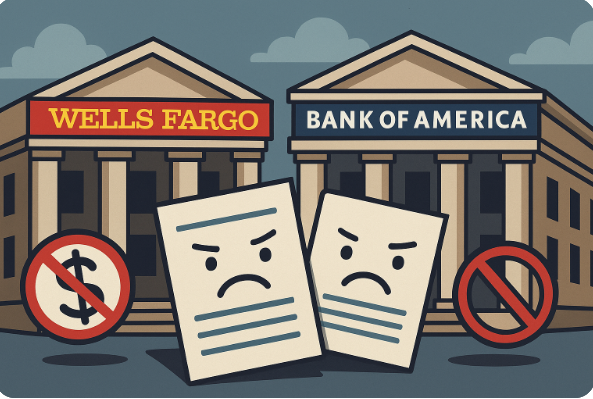Introduction: Why the Same Names Keep Coming Up
When headlines break about banks mistreating customers, the names are often familiar: Wells Fargo. Bank of America. Citibank. JPMorgan.
It feels like déjà vu: new fines, new scandals, new promises to “rebuild trust.” Yet middle-class Americans still end up paying the price. To understand why, we need to trace the history of these scandals, how they repeat, and what consumers can actually do to protect themselves.
A Brief History of Bank Scandals in America
Bank scandals aren’t new. From the Savings and Loan Crisis in the 1980s, to predatory mortgage lending before the 2008 crash, big institutions have repeatedly tested the limits of regulation.
Why? Because scandals often bring in huge short-term profits, while fines years later become just “the cost of doing business.”
Case Study #1: Wells Fargo – The Fake Accounts Scandal
In 2016, Wells Fargo admitted that employees—pressured by aggressive sales quotas—created millions of fake accounts in customers’ names without permission.
- Impact: Damaged credit scores, unauthorized fees, and ruined trust.
- Fallout: $3 billion in fines and a CEO resignation.
- Pattern: A culture that rewarded unethical sales practices at scale.
Even after this scandal, Wells Fargo has been hit with additional enforcement actions: improper mortgage modifications, car insurance add-ons, and mismanagement of retirement accounts.
It wasn’t just one scandal—it was a system.
Case Study #2: Bank of America – Fees, Foreclosures, and Fraud
Bank of America’s rap sheet is long. Highlights include:
- Mortgage abuses post-2008: Accused of pushing risky subprime mortgages, then botching foreclosures when the housing market collapsed.
- 2023 CFPB action: Ordered to pay $250 million for double-charging overdraft fees, withholding credit card rewards, and opening unauthorized accounts.
- Robo-signing scandal: Bank employees mass-signed foreclosure documents without verifying accuracy, displacing families unlawfully.
For many middle-class Americans, these weren’t abstract scandals—they were eviction notices and drained bank balances.
Why Do Scandals Keep Happening?
- Scale and Complexity
When a bank has 60+ million customers, small abuses scale into billions in harm.
- Incentives Misaligned
Employees are often rewarded for hitting sales or fee targets, not for customer well-being.
- Regulatory Lag
By the time regulators (like CFPB, OCC, or DOJ) catch and fine banks, the profits are already booked.
- “Too Big to Fail” Mentality
Mega-banks know they’re essential to the economy. That knowledge can breed risk-taking.
The Regulatory Role: Watchdog or Lapdog?
Agencies like the Consumer Financial Protection Bureau (CFPB), Office of the Comptroller of the Currency (OCC), and Federal Reserve have levied billions in fines.
But critics argue that fines—while headline-grabbing—don’t change systemic behavior. When a bank pays $500 million in penalties but makes $20 billion a year, is that punishment or just a business expense?
Some argue reforms like executive clawbacks or individual criminal liability are the only way to shift behavior.
How Scandals Impact You Directly
- Higher Costs: Banks pass along losses through new fees and account terms.
- Credit Damage: Fake accounts or wrongful foreclosures can harm scores for years.
- Trust Erosion: Consumers become wary of mainstream banks, often without better alternatives.
Lessons Learned: How to Protect Yourself
- Watch Your Accounts Like a Hawk
Regularly check your credit reports (free at AnnualCreditReport.com) for accounts you didn’t open.
- Question “Add-On” Products
Extended warranties, identity theft protection, “courtesy” overdraft—many scandals stem from upselling junk.
- Use Multiple Accounts
Don’t keep all funds with one institution. Splitting between a traditional bank and a credit union/online bank diversifies risk.
- File Complaints Early
If wronged, file with the CFPB. Complaints are tracked, and patterns trigger investigations.
Related Reads:
Tailored Call-to-Action
Look at your bank’s history. Has it been fined or investigated in the past five years? If so, ask yourself: Do I want to keep trusting them with my paycheck, savings, and mortgage?
Your money deserves a partner, not a repeat offender. If your bank can’t meet that standard, it’s time to switch.
